Related Research Articles

John Fiske was an American philosopher and historian. He was heavily influenced by Herbert Spencer and applied Spencer's concepts of evolution to his own writings on linguistics, philosophy, religion, and history.

Lyman Beecher was a Presbyterian minister, and the father of 13 children, many of whom became writers or ministers, including Harriet Beecher Stowe, Henry Ward Beecher, Charles Beecher, Edward Beecher, Isabella Beecher Hooker, Catharine Beecher, and Thomas K. Beecher.

Theodore Dwight Weld was one of the architects of the American abolitionist movement during its formative years from 1830 to 1844, playing a role as writer, editor, speaker, and organizer. He is best known for his co-authorship of the authoritative compendium American Slavery as It Is: Testimony of a Thousand Witnesses, published in 1839. Harriet Beecher Stowe partly based Uncle Tom’s Cabin on Weld's text; the latter is regarded as second only to the former in its influence on the antislavery movement. Weld remained dedicated to the abolitionist movement until slavery was ended by the Thirteenth Amendment to the United States Constitution in 1865.

Orthopedic surgery or orthopedics is the branch of surgery concerned with conditions involving the musculoskeletal system. Orthopedic surgeons use both surgical and nonsurgical means to treat musculoskeletal trauma, spine diseases, sports injuries, degenerative diseases, infections, tumors, and congenital disorders.

Marcus Morton was an American lawyer, jurist, and politician from Taunton, Massachusetts. He served two terms as the governor of Massachusetts and several months as Acting Governor following the death in 1825 of William Eustis. He served for 15 years as an associate justice of the Massachusetts Supreme Judicial Court, all the while running unsuccessfully as a Democrat for governor. He finally won the 1839 election, acquiring exactly the number of votes required for a majority win over Edward Everett. After losing the 1840 and 1841 elections, he was elected in a narrow victory in 1842.
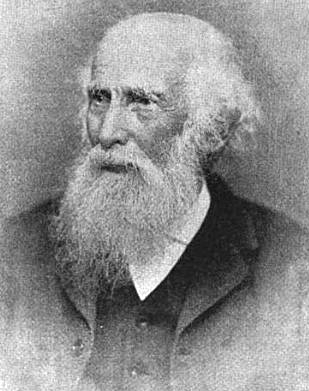
Elizur Wright III was an American mathematician and abolitionist. He is sometimes described in the United States as "the father of life insurance", or "the father of insurance regulation", as he campaigned that life insurance companies must keep reserves and provide surrender values. Wright served as an insurance commissioner for the Commonwealth of Massachusetts.
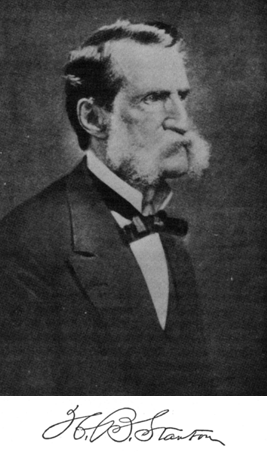
Henry Brewster Stanton was an American abolitionist, social reformer, attorney, journalist and politician. His writing was published in the New York Tribune, the New York Sun, and William Lloyd Garrison's Anti-Slavery Standard and The Liberator. He was elected to the New York State Senate in 1850 and 1851. His wife, Elizabeth Cady Stanton, was a world renowned leading figure of the early women's rights movement.
Hand surgery deals with both surgical and non-surgical treatment of conditions and problems that may take place in the hand or upper extremity including injury and infection. Hand surgery may be practiced by post graduates of orthopedic surgery and plastic surgery.

William Upham was an American attorney and politician from Montpelier, Vermont. He was most notable for his service as a United States senator from Vermont.
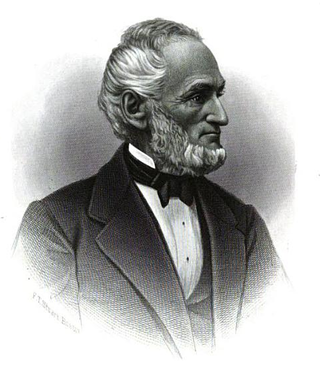
Amasa Walker was an American economist and United States Representative. He was the father of Francis Amasa Walker.
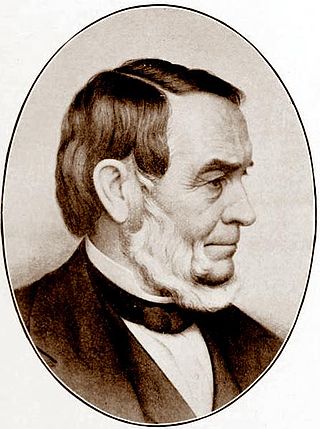
Samuel Joseph May was an American reformer during the nineteenth century who championed education, women's rights, and abolition of slavery. May argued on behalf of all working people that the rights of humanity were more important than the rights of property, and advocated for minimum wages and legal limitations on the amassing of wealth.

Originating in New England, one particular Beecher family in the 19th century was a political family notable for issues of religion, civil rights, and social reform. Notable members of the family include clergy, educators, authors and artists. Many of the family were Yale-educated and advocated for abolitionism, temperance, and women's rights. Some of the family provided material or ideological support to the Union in the American Civil War. The family is of English descent.

Rev. Joshua Leavitt was an American Congregationalist minister and former lawyer who became a prominent writer, editor and publisher of abolitionist literature. He was also a spokesman for the Liberty Party and a prominent campaigner for cheap postage. Leavitt served as editor of The Emancipator, The New York Independent, The New York Evangelist, and other periodicals. He was the first secretary of the American Temperance Society and co-founder of the New York City Anti-Slavery Society.

Calvin Ellis Stowe was an American Biblical scholar who helped spread public education in the United States. Over his career, he was a professor of languages and Biblical and sacred literature at Andover Theological Seminary, Dartmouth College, Lane Theological Seminary, and Bowdoin College. He was the husband and literary agent of Harriet Beecher Stowe, author of the best-seller Uncle Tom's Cabin.
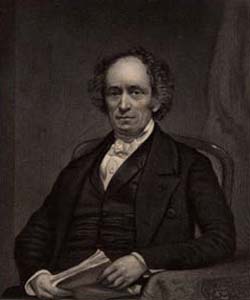
Heman Humphrey was a 19th-century American author and clergyman who served as a trustee of Williams College and afterward as the second president of Amherst College, a post he held for 22 years.
Robert Otto Becker was a U.S. orthopedic surgeon and researcher in electrophysiology/electromedicine. He worked mainly as professor at Upstate Medical Center in State University of New York, Syracuse, and as Director of Orthopedic Surgery at the Veterans Administration Hospital, Syracuse, New York.
William Ludwig Detmold was a German-American surgeon who introduced orthopedic surgery into the United States.
Thomas Treadwell Stone was an American Unitarian pastor, abolitionist, and Transcendentalist.

William Williams Mather was an American geologist.
Erasmus Darwin Hudson Jr., M.D. was an American thoracic physician and educator.
References
- ↑ Biographical note, Hudson family papers Archived 2013-11-09 at the Wayback Machine , Asteria, Five Colleges library
- 1 2 3 4 One or more of the preceding sentences incorporates text from a publication now in the public domain : Wilson, J. G.; Fiske, J., eds. (1892). . Appletons' Cyclopædia of American Biography . New York: D. Appleton.
- ↑ The Hudson Family Papers, the Special Collections & University Archives, W.E.B. Du Bois Library, Univ. of Massachusetts